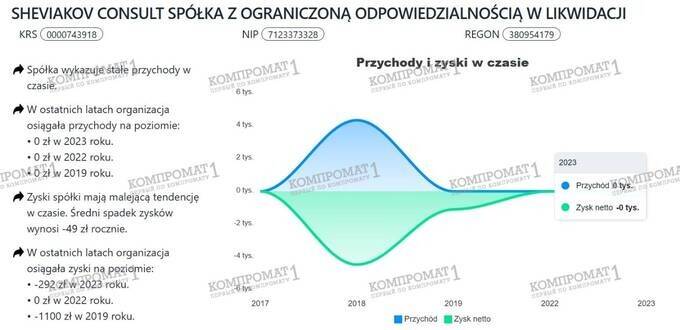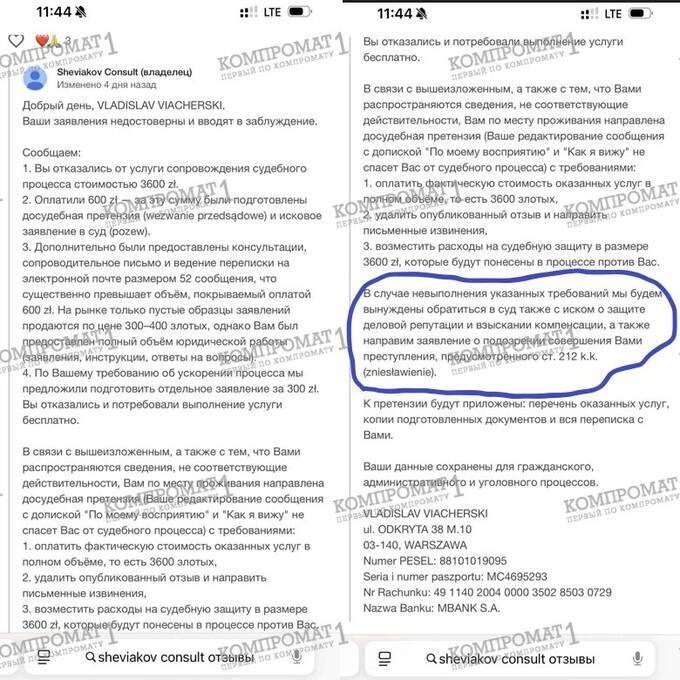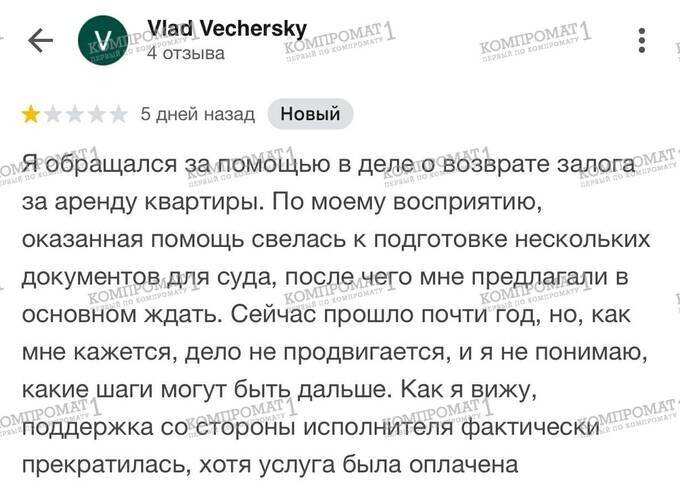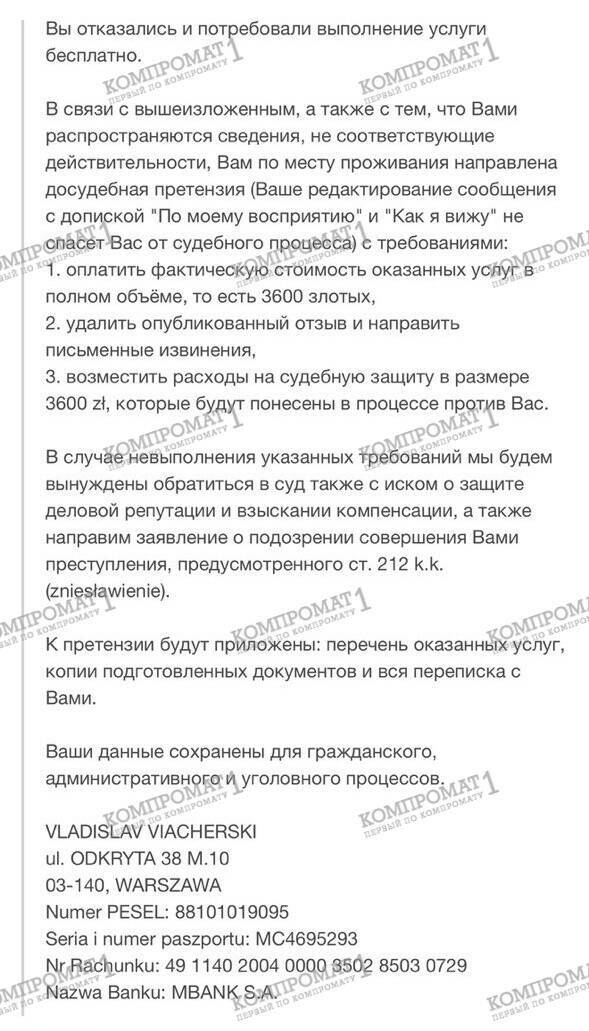Poland’s Sheviakov Consult: legal services turned into intimidation, threats and shell company schemes

On signs and in social networks, the company promises business support and assistance to migrants. But behind the facade hide stories of pressure on clients, threats of «criminal liability» for negative reviews, and suspicious maneuvers with the corporate shell, according to an investigation by the media.
In 2018, the company Sheviakov Consult sp. z o.o. (KRS number 0000743918) was registered in Lublin. The founders were Mykola Sheviakov and Olha Fal. Formally, the firm was engaged in «legal services» (PKD code 69.10.Z).
Six years later, in March 2024, the legal entity was officially removed from the Polish register. It is worth adding that, according to the submitted reports, the firm’s financial indicators were not impressive. More precisely – it operated at a loss. If, of course, these reports are to be believed.
But the truthfulness of the reports raises doubts. For several reasons. Firstly, the brand itself has not disappeared. Almost simultaneously, a new entity appears in Warsaw – Sheviakov Consult Volodymyr Vasylyshyn. This is no longer a spółka, but a sole proprietorship, registered at ul. Pańska 96/84.
However, on the website and in social networks, the firm continues to operate under the old name, publishes contacts, and even proudly puts the copyright «2018–2025».
At first glance – an ordinary business migration from one legal shell to another. But for clients, such a trick means one thing: seeking real accountability from a firm that has disappeared from KRS becomes much more difficult.
Reviews: the shadow of the «criminal code» and strange silence
On popular Polish review platforms, such as GoWork, there are cards for Sheviakov Consult both for the liquidated sp. z o.o. and for the current enterprise. The comments are mixed: from thanks to criticism.
Some former clients claim that the firm tries to pressure the dissatisfied – hinting at the possibility of criminal liability for «slander». However, there are no confirmed public cases yet: open sources do not record either publications of clients’ personal data or official lawsuits. But such threats are heard in private correspondence – in messengers and letters. Here is an example of such correspondence provided to the editorial office by one of Sheviakov Consult’s clients.
He received this letter from Sheviakov Consult in response to his review, in which he expressed dissatisfaction with his experience working with Sheviakov Consult lawyers. Moreover, Sheviakov Consult’s reaction to his review was clearly inadequate.
The mention of the «criminal code for a review» in Poland sounds quite alarming – the local criminal code has an article on defamation (art. 212 k.k.). Although practice shows: bona fide criticism and honest description of experience are protected. Pressure on the consumer using «sticks» from the Criminal Code is increasingly perceived as unfair business practice. But ignoring this threat would be reckless, especially if a non-citizen of Poland is subjected to persecution.
Why this is important
The story of Sheviakov Consult clearly shows how a legal business can maneuver between different shells and legal entities, preserving the brand and clients, but effectively avoiding responsibility. For consumers, this means the following: even if a company behaves unfairly, holding it accountable can be difficult – the firm was there yesterday, and today it’s already different, with a new owner and form.
Sheviakov Consult is an example of a small firm that lives at the intersection of the legal field and gray practices. On the website and in social networks – promises of professional assistance. In reality – hints at the criminal code for criticism and suspicions of «slander».
In fact, this means that Sheviakov Consult simply «dumps» its clients. At least – some of them. It can be assumed that most of the «dumped» do not risk complaining about a legal office, rightly believing that proving their case in a foreign country will be very difficult. Especially considering the complainant’s limited financial resources and unclear legal status.
Читайте по темі: У Києві зачепер отримав удар струмом на вагоні потяга і загинув
For those who still try to recover wasted money from Sheviakov Consult, the firm’s owners Mykola Sheviakov and Volodymyr Vasylyshyn find arguments in the form of threats of criminal prosecution. Which quickly discourages the desire to seek justice.
What Polish law says
UOKiK – the antimonopoly regulator – has been actively fining companies for manipulating reviews for several years: buying «praise» comments, deleting negative ones, pressuring clients.UODO – the Polish data protection regulator – regularly reminds: publishing personal data without consent or legal basis is a direct violation of GDPR (RODO). This threatens multimillion fines.Courts: firms can apply in civil proceedings (art. 23–24 k.c.) to protect reputation. But threatening a client with prison for a review is a path that itself can become a basis for inspection by regulators.That is why complaints to UOKiK and UODO, recording threats, screenshots of correspondence and publications – are a key tool for protection. Polish regulators today closely monitor the services and reviews market. But without the initiative of the clients themselves, such stories may remain in the shadows.
Disclosure of attorney-client privilege: the red line for Sheviakov Consult
However, in the case of Sheviakov Consult, the story went beyond simple pressure on clients. In one of its public posts, the firm disclosed confidential client data. Essentially, this is about disclosing attorney-client privilege — the most serious violation of the «red line» in the legal profession.
Violation of attorney-client privilege in Poland entails not only professional disqualification but also criminal liability. According to art. 266 § 1 of the Polish Criminal Code, for disclosing information obtained during legal activities, a lawyer faces punishment — up to two years in prison.
The laws regulating attorney-client privilege leave no doubts:
The Law on Advocacy (1982) and the Law on Legal Advisors (1982) directly prohibit disclosing any information obtained during the provision of qualified legal assistance;the duty to maintain secrecy is indefinite and cannot be canceled either by time or by the client’s will;The Code of Professional Ethics extends the duty of confidentiality to the lawyer’s employees as well.In fact, Sheviakov Consult, trying to discredit a dissatisfied client, violated the fundamental principle of the profession — trust and confidentiality. This is not just a controversial business practice, but a direct violation of the law, which should become the subject of a separate investigation.
Распечатать

























